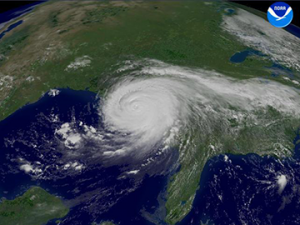 A recent post examined the proportion of climate scientists that support the anthropogenic causes of climate change. One topic brought up was the potential impact on the insurance industry. Potential shifts in rainfall, more severe storms, and prolonged droughts – like those witnessed this summer in Texas – cause damage to assets such as crops, homes, and property. As was seen throughout the previous decade, hurricane insurance in Florida led to a major undertaking for the state as it attempted to reconcile intense storms with fiscal well-being of its residents. Will relatively cheap insurance quotes still be available in a world affected by climate change?
A recent post examined the proportion of climate scientists that support the anthropogenic causes of climate change. One topic brought up was the potential impact on the insurance industry. Potential shifts in rainfall, more severe storms, and prolonged droughts – like those witnessed this summer in Texas – cause damage to assets such as crops, homes, and property. As was seen throughout the previous decade, hurricane insurance in Florida led to a major undertaking for the state as it attempted to reconcile intense storms with fiscal well-being of its residents. Will relatively cheap insurance quotes still be available in a world affected by climate change?
Shifts in the climate have also led to the rise of Re-insurance. As noted last year in a post by Matt de la Houssaye, “According to Swiss Re [one of the world’s largest and most diversified reinsurers], the economic effects of current climate impacts can amount to between 2-12% of GDP annually. These impacts threaten to undermine national budgets of vulnerable countries for years to come.” Reinsurers have gained in popularity because they transfer the risk or spread it out over other options. According to investopedia, it is also known as insurance for insurers.
Knowing when a natural disaster will hit, or its severity, remains an inaccurate science, hence the need for insurance. Whether cheap insurance will remain, or rates will raise significantly, remains to be seen. Unfortunately, the likelihood of intense storms leaves homeowners (and renters who need to insure their personal property – trust me on this one, I speak from first hand experience with renter’s insurance) with a difficult financial decision: pay up front for some fairly cheap insurance coverage or risk a significant loss.
A changing climate could have economic impacts that alter the way insurance works today. As seen in the case of the budding reinsurance industry, huge losses associated with severe weather costs all parties dearly. The emotional toll of losing your belongings – along with the unintended waste generated from a storm’s damaging winds and precipitation – can be difficult to overcome. Add the financial drain of rebuilding, paying the insurance premium or deductible, and temporarily relocating, and you have the perfect storm that sweeps any thought of sustainability right out to sea.
[Image source]
